Gifted and Talented News
Dr Colleen Robertson

Gifted and Talented News
Dr Colleen Robertson
Term 2 has certainly been busy in our Gifted and Talented space.
First up, I would like to congratulate Joseph Lewis, who succeeded in winning the State final of the annual National School Constitutional Convention competition, meaning he was able to represent Queensland in the Australia-wide final this term. This was certainly an honour and one that Joe explains in his own words:
From 21-23 March, I was fortunate to attend the 28th National Schools Constitutional Convention. This programme is an opportunity for students in Years 11 and 12 to examine an Australian Constitutional issue – this year, ‘Is section 128 still a necessary requirement to change such an important document as the Australian Constitution?’. The Convention was hosted in Old Parliament House, Canberra and included keynote addresses from eminent politicians, lawyers, and academics, working groups, soapbox sessions. We also attended Question Time at Parliament House, dinner at the High Court, and an official reception at Government House. I can’t express enough my gratitude for this opportunity which ranks in the best of my school career.
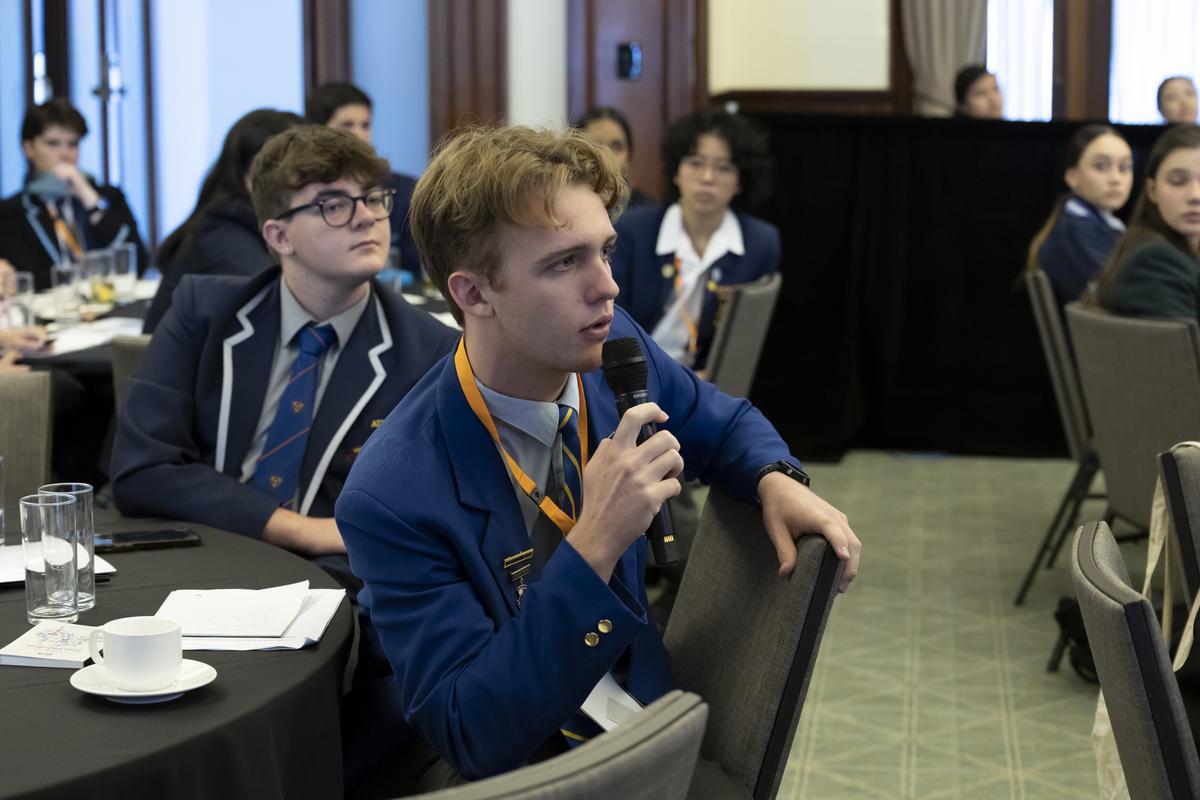

Another competition that got off to a fine start this term was the Brain Bee Competition, organised for Year 10 students by the Australian Neuroscience Society. This competition allows boys to learn about the workings of the brain and includes an opportunity to observe a dissection in process. Round 1 took place on Friday 31 March, facilitated by Ms Ellie Kenny. The team, who had been studying brain science weekly in preparation, was made up of Hammish Darr, Hudson Ergstrom, Aiden Hassed, Aidan Phillips and Lachlan Vink.
Special congratulations are owed to two boys whose results mean they have made it through to the next round. Aidan Phillips and Lachlan Vink will sit the challenging Round 2 competition on Tuesday 1 August at The University of Queensland.
Thanks are also due to Ms Kenny and the Brain Bee team for helping to run a memorable session of the STEM Club for students in Years 7 to 9. The group met for another opportunity to dissect a sheep brain, which boys engaged with thoughtfully. Thank you also to the technicians who helped make this event possible. STEM Club also ran a titration Competition and offered a session to investigate the Doppler Effect. I will hand over to Mr Travers to explain what happened:
Yes, we investigated the Doppler Effect (you know the sound that a fast-moving car makes as it whizzes past you?) 🏎️ A sound source that is moving towards you causes the pitch of the sound to rise and when the object is moving away it causes the pitch to become lower. If we know the speed of sound (343m/s) and the frequency of the sound source (in this case 100Hz) we can measure the shift in frequency and use that to calculate the speed of the moving object. The Boys used their mobile phones and the "Physics ToolBox" App which is really cool to measure frequency and algebra to calculate the speed of a moving teacher on a bicycle, which was found to be very fast. 🚲
STEM Club undertook a series of other fun and informative activities this term. Ms Rowan Dekkers provides a round-up, including 'Paddle Pop Stick Catapults', where students made a catapult out of only paddle pop sticks and rubber bands. One student managed to launch a projectile three and a half metres! We then sized up our catapults and launched ping pong balls down the Science Centre hallway. The catapults that didn't break upon launch managed to launch the ping pong balls about five metres. On another occasion, students flew tiny drones around a race course, and the Club finished off the term with a session on combustion reactions.
I would like to thank Ms Dekkers for her commitment to the STEM Club and also for her poetic license in the following description of a further event that took place this term:
The titration competition was a one-off event for Years 10, 11 and 12 Chemistry students. We took four teams of three to the University of Queensland. We had practised for a few weeks during lunchtimes and afternoons. On a brisk Saturday morning, our Chemistry students were up and tom, meeting at the University of Queensland to compete in the national titration competition. The titration technique requires plenty of concentration, but our boys were in their element. They kept their ion the prize and found a solution to every problem. The boys formed strong bonds with their teammates and a great time was had by all.
Term 2 saw the start of Philosophy Club at Marist College Ashgrove and many boys across Grades 11 and 12 were eager to attend lunch time meetings and discuss moral dilemmas and engage in some friendly philosophical debate. We discussed Utilitarianism, Deontology and Consequentialism, applying these to moral dilemmas relevant for the group.
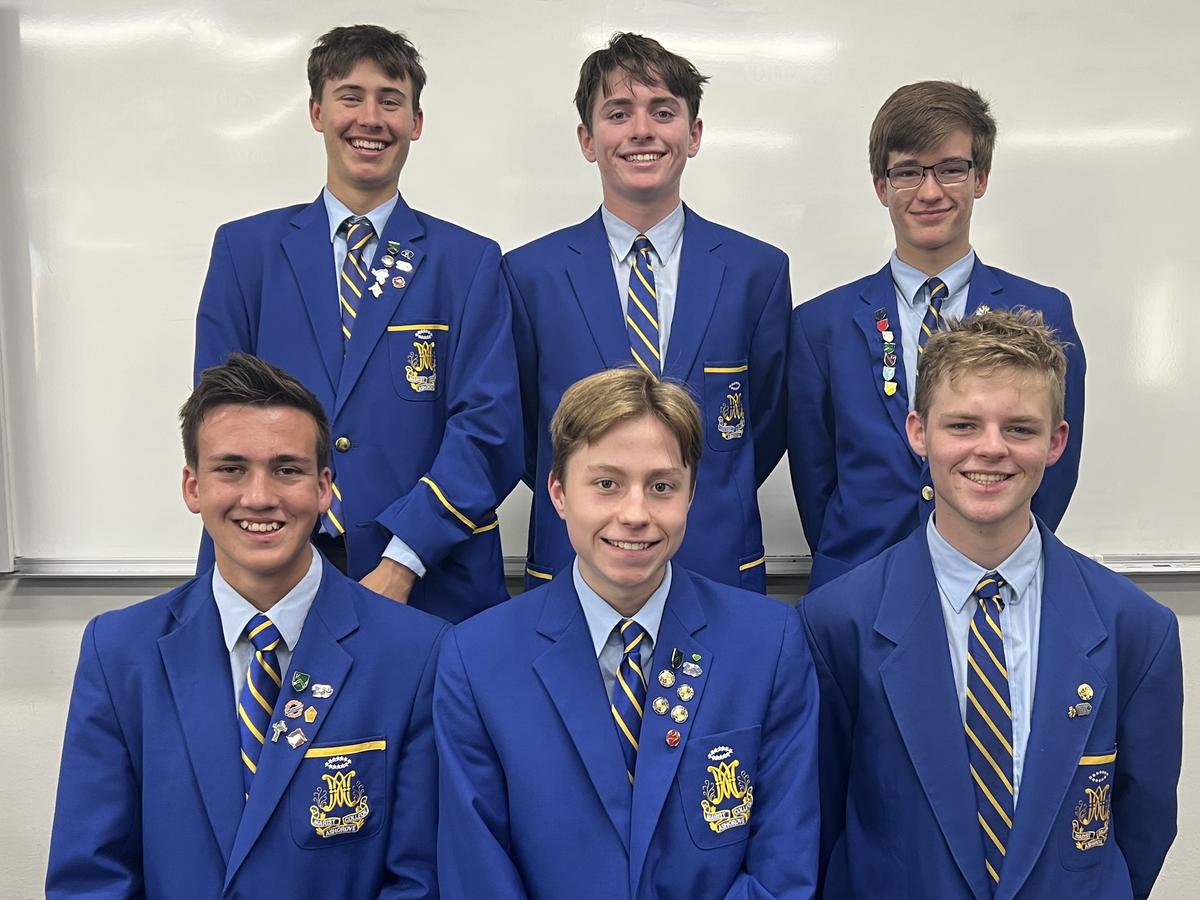

Back Row: William Nickerson, Frank Piper and Zac Colquhoun
Front Row: Kalen Neville, Jake Edye and Will Waring
In particular, the Senior Ethics Olympiad Round 1 competition, which took place on Thursday 11 May, was a chance for six Year 11 students to practise their philosophical debate skills. Twenty-one schools around Queensland came together on Zoom to participate in a full day of case-based challenges. The cases ranged from discussions around tax and the distribution of wealth to lookism and the likelihood of subsidised plastic surgery due to looks-based discrimination. It was a truly rewarding day for the boys, who heard many insightful views from both fellow competitors and judges.
Philosophy Club will continue through Term 3 and we are on the lookout for Year 7-9 students with an interest in competing in the Middle School Ethics Olympiad in November. This is a wonderful opportunity to discuss real-life dilemmas such as cheating, peer pressure and animal cruelty.
Thanks to Miss Lucy Naughton, who runs the club and adds: “meetings will begin again in Term 3: Wednesday during Break 1. More details to follow in student notices.”
Mr David O'Brien has given me this round-up of what has been taking place with the Future Problem-Solving Program: (FPS) continues to run this semester, with the students involved – Harrison Dyer, Maximillian Bathersby and Remy Versace – about to submit the second practice problem. The program focuses on developing critical, creative, and futuristic thinking skills by challenging students to apply a six-step process to some of the significant issues facing the world of today and the future.
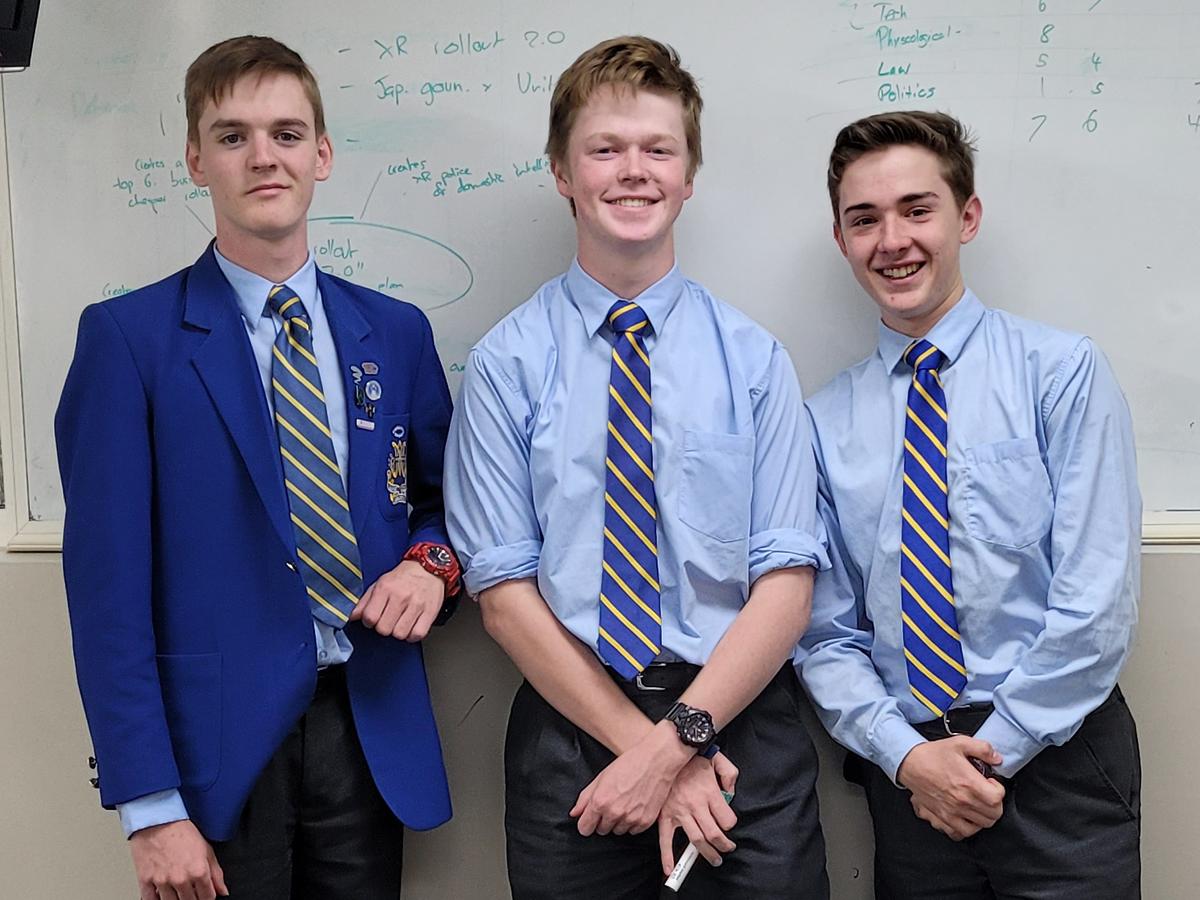

Remy Versace, Maximillian Bathersby and Harrison Dyer
The first practice problem in Term 1 asked the boys to consider Nigeria’s E-Waste Industry in the year 2047. Step 1 asked the team to come up with a total of 16 possible challenges – in response to a range of specific categories – that could be identified in the Future Scene, support these with research that explored how the problem existed in the world of today, and then use this information to consider how each of the challenges could impact Nigeria in 2047. Step 2 involved the boys deciding on an underlying problem that was characteristic to all 16 of their challenges identified in Step 1. For this task, the team focused on the need for regulation in the E-Waste Industry that if implemented, would have a positive impact in Nigeria’s political, economic, and environmental sectors. For Step 3, the boys had to generate solutions to all 16 of their initial challenges but do so in such a way that each would address and solve the underlying problem identified in Step 2. Feedback on this initial practice problem was very positive. Their range of challenges demonstrated originality as well as both clarity and insight. Judges also identified effective and relevant research that demonstrated a complex understanding of the topic as well as clever and innovative thinking.
Currently, Harrison, Maximillian and Remy have been working on the second practice problem, which is to be submitted at the end of Week 7. This has asked them to consider the range of challenges relevant to Tokyo in the year 2044 as it transitions to become the first Extended Reality (XR) megacity in which citizens are both encouraged, but more so expected, to live and work in a virtual world. In addition to completing Steps 1 – 3, the boys are also completing Steps 4 – 6. This has asked them to select criteria that would determine which five of their solutions will do the best job at solving their underlying problem; apply criteria to rank these on a scale of 1-8 (poorest to best); and then write up an action plan that explores and justifies their highest scoring solution. The team has been working very well on this and are on track to submit everything by the due date.
Given that most of this work takes place during breaks as well as outside of school hours, the entire team should be commended for their efforts. From a coach’s perspective, it has been especially pleasing to see not only the high-quality work that is produced, but more so how they have come together as a team and support each other to do their best. They are working towards the satisfactory completion of a Qualifying Problem in Term 3 which investigates the ‘Robotic Workforce’, something completed over a two-hour time limit and lock down conditions, and a fourth Practice Problem in Term 4 that looks at the implications of the ‘Throw Away Society’. Ultimately, the team’s end goal is participation in a national competition. Were this to happen, I am confident they would represent the College in an admirable way.
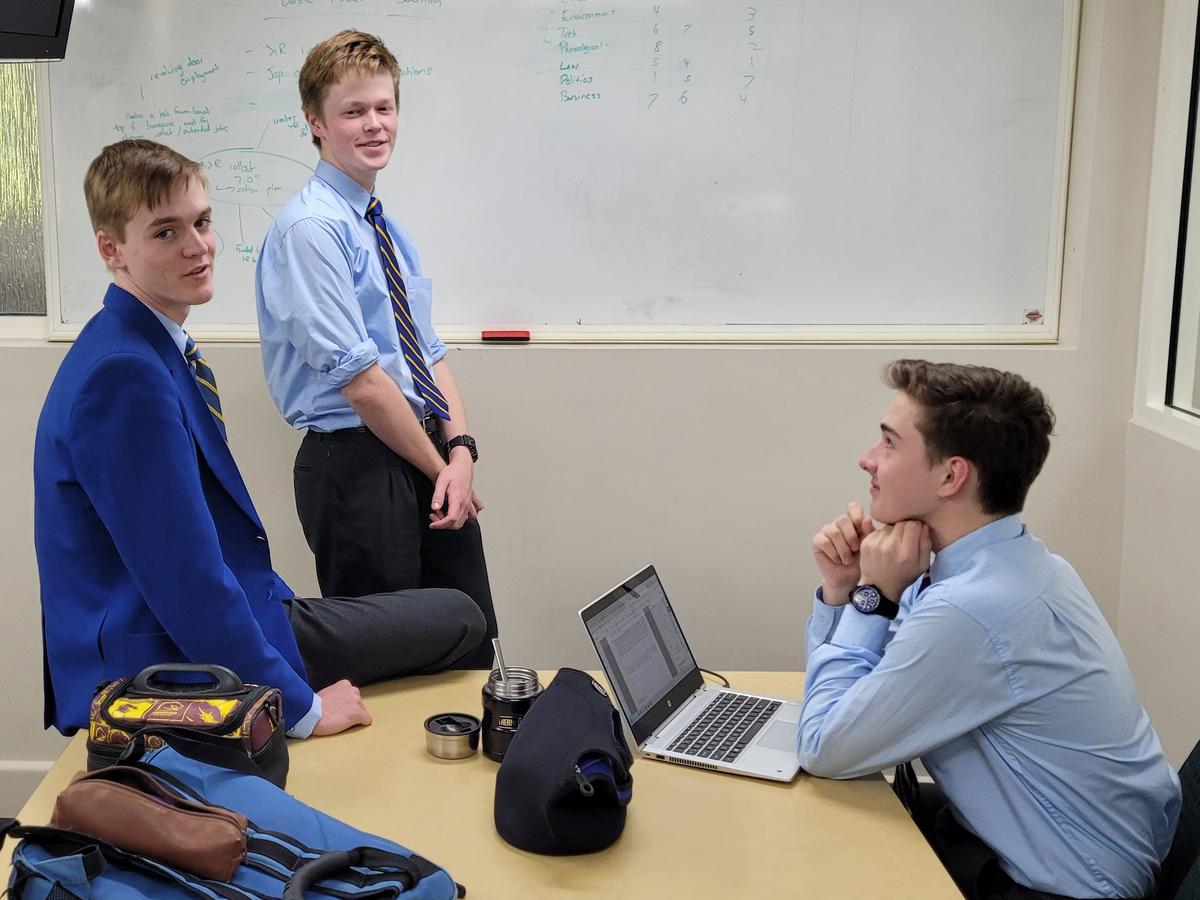

Remy Versace, Maximillian Bathersby and Harrison Dyer
All students should consider involvement in the program because of how it teaches them to think and to use their imagination in applying research and strategies to resolving issues, but also for the skills it provides in working as a team. For any information, feel free to contact Mr David O’Brien (Humanities Curriculum Leader).
Cyber Club
The Cyber Club continues to meet on Monday mornings in Room 406 at 7:30am with industry specialist, Mr Adam Graham. A notable session this term involved our College’s own IT Director, Mr Kevin Berry, who addressed the boys on Thursday 24 April regarding data breaches and how they can affect institutions.
The boys, Max Gallagher, Ben Hartfield, James Larme and Cullen Fitzgerald, photographed here with Adam Graham and Mr Kevin Berry, enjoyed the informative session. Thanks go to Ms Tara Franklin for facilitating that Club.
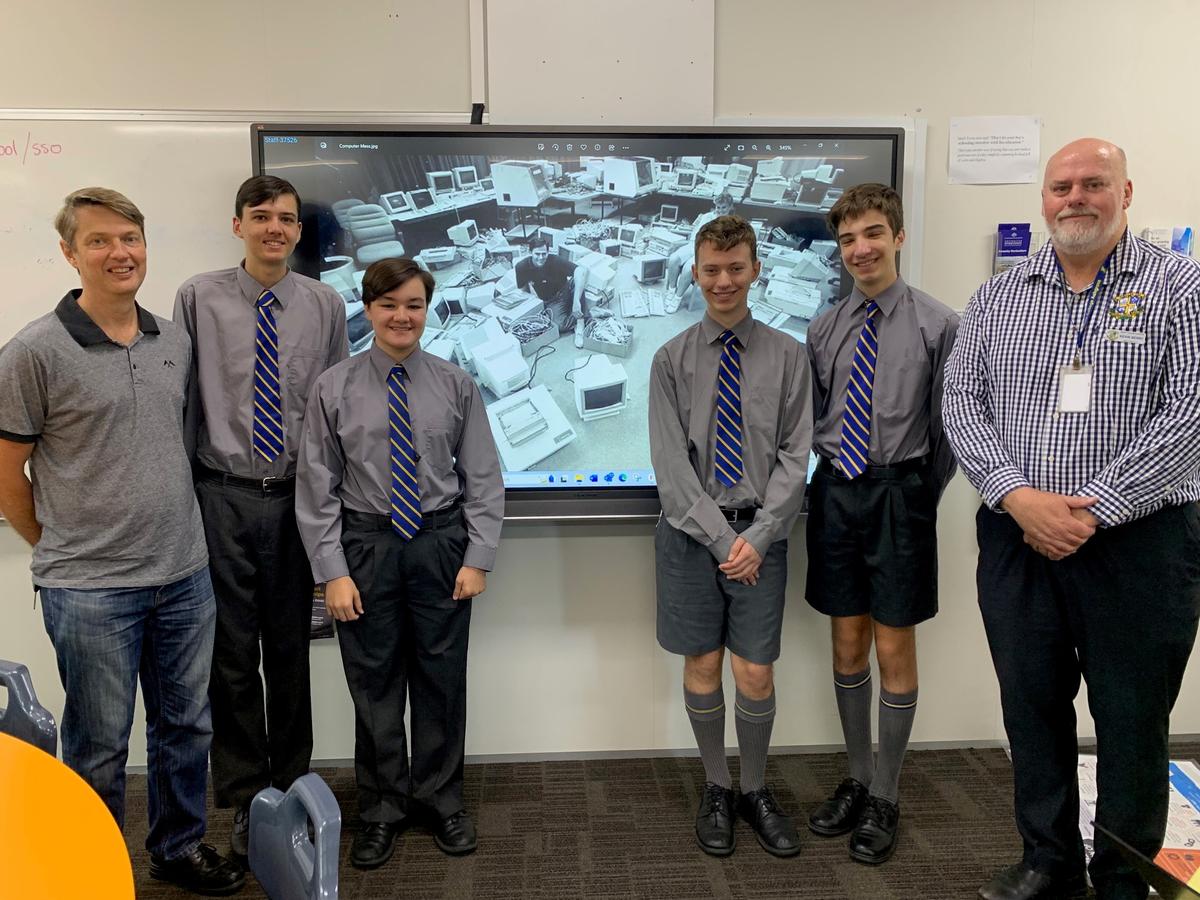

Left to right: Mr Adam Graham, Max Gallagher, Cullen Fitzgerald, Ben Hartfiel, James Larme and Mr Kevin Berry
This term saw the launch of a brand-new initiative in College. I was delighted to introduce the rationale behind holding a club devoted to the art of the short story in a recent assembly. Here is what I shared with the boys:
“Why are we constantly being advised to read books? What is so special about reading? Here are a few famous responses to that perennial question: why read?
“A Hope of something beyond our place and time. That is what books- the best books- give us: a lifeline, a reason to believe, a way to breathe more freely.”
Blake Morrison
“We refer every story that we read to our lives, because the medium of written narrative is intimately involved with the way we make up ourselves.”
Carmen Callil
Ok, so if we can accept that reading has plenty of value, then how do we answer the next, practical question- what does it mean to be well-read? Does it mean we are constantly reading and always have at least one book on the go? Maybe. Does it mean we have read a wide range of books, fiction and non-fiction, from different genres and time periods and countries? Certainly. But how, in a world that is constantly competing for our attention, can any of us hope to become well-read?
I propose a simple solution, or at least a starting point: join the new Short Story Forum. What, then, is Short Story Forum? Taking place in Room 403 at Morning Break every Wednesday, Short Story Forum is a club that meets to discuss some of the best fiction ever written. Initially, the club will be open to students in Grades 10 to 12. The idea is to meet at Morning break where you can eat your lunch while listening to a reading of a complete short story. After taking a little time to digest (both your lunch and the story) you can take part in a discussion about the story’s characters, themes, message and style.
It couldn’t be simpler; you do not need to prepare or read anything in advance and the materials will be provided for you. But that’s not all- by attending for only one term you will have the opportunity to read and discuss whole texts by some of the world’s most famous authors. You will be able to speak with confidence about the way Graham Green, Ernest Hemingway, Saki, Shirley Jackson, Hilary Mantel, Ruth Rendle, Henry Lawson, Chimamanda Adichie and others write.
And that is still not all! Going out into the world as a well-read citizen has implications beyond what you gain personally; it will allow you to understand cultural references in many walks of life. It will give you dinner party conversation and interview fodder. (Who is your favourite author and why? Has long been established as an interview question in interviews for Medicine and Engineering, as well as for the more obvious courses in English Literature and Film.)”
Initially, I am opening the club to older readers, but in time, the hope is to expand to include all-year groups sitting in this room. For now, if you are in Years 10, 11 or 12 and wish to take advantage of a great chance to become well-read, all you need to do is commit to attending on break times on Wednesdays, where I will be running this session in Room 403, come and bring your lunch at the beginning of Morning Break 1 next Wednesday and find out for yourself what all the fuss is about reading. I will leave you with some final thoughts from the journalist and writer Tim Parks.
“Because the excitement of reading is the precarious one of being alive now, intensely mentally silently alive, and reacting from moment to moment, in the most liquid and intimate sphere of mind, to someone else’s elusive construction of the precarious business of being alive now.”
Tim Parks
Another new initiative has been the introduction of an academic tutorial system. This does not replace the interviews skilfully carried out by the Academic Care Team; it simply adds an additional layer for our high-performing students in the academic sphere. I have thoroughly enjoyed meeting with parents and of our highest-attaining students in Year 8 and have certainly valued getting a chance to meet with those boys. As I explained to those involved, we have come to affectionately know the current Year 8 as ‘the COVID-19 year,’ in recognition of the opportunities and rites of passage they missed in the crucial transition time of end of Year 6 and beginning of Year 7, and so this is the year group I decided to target first. In time, the plan is to extend this provision of an academic tutor group to other Years. Next term, I am looking ahead to breakfast opportunities where we can meet together and have fun bonding over philosophical conundrums.